Explore the differences between relationship coaching and therapy, their benefits, and when to choose coaching for personal growth.In today’s fast-paced world, relationships can often face unique challenges that require specialized guidance. While both relationship coaching and therapy offer valuable support, their approaches and objectives differ significantly. Understanding these distinctions can empower individuals and couples to make informed choices about the help they seek. This article delves into the nuances of relationship coaching and therapy, exploring their respective objectives, methods, and benefits. Whether you’re aiming for personal growth, improved communication, or deeper connection, this guide will equip you with the knowledge to decide when to engage a relationship coach or a therapist. Join us as we clarify these important concepts to foster healthier, more fulfilling relationships.
Understanding Relationship Coaching: Objectives and Methods
Relationship coaching focuses on helping individuals and couples achieve specific goals in their personal relationships. Unlike therapy, which often delves into emotional and psychological issues stemming from the past, relationship coaching is more future-oriented, emphasizing strategies and practical solutions for enhancing relational dynamics.
The primary objectives of relationship coaching include:
- Identifying personal and shared goals within a relationship.
- Enhancing communication skills to foster understanding and connection.
- Developing conflict resolution strategies to handle disagreements effectively.
- Encouraging personal growth and self-awareness for both partners.
- Creating actionable plans to implement positive changes in the relationship.
Methods utilized in relationship coaching are often varied, comprising elements such as:
- Goal-setting: Coaches work with clients to define clear, achievable goals for the relationship.
- Accountability: Regular check-ins help partners stay on track towards their goals.
- Skill-building exercises: Partners engage in activities designed to strengthen their interpersonal skills.
- Ongoing support and feedback: Coaches provide continuous guidance to ensure the relationship is on a healthy trajectory.
One of the crucial distinctions between relationship coaching and therapy lies in the approach to dealing with issues. While therapy may be guided by a therapist’s diagnosis and treatment methods, coaches generally adopt a partnership approach, collaborating with clients to explore their beliefs and motivations without delving too deep into past traumas.
Overall, relationship coaching serves as a proactive measure for couples looking to enhance their relationship rather than treating existing issues or mental health disorders, making it an appealing option for many pairs. This focus on the future, alongside specific techniques and strategies, highlights the differences between coaching and therapy, providing a structured yet flexible framework for growth and improvement in relationships.
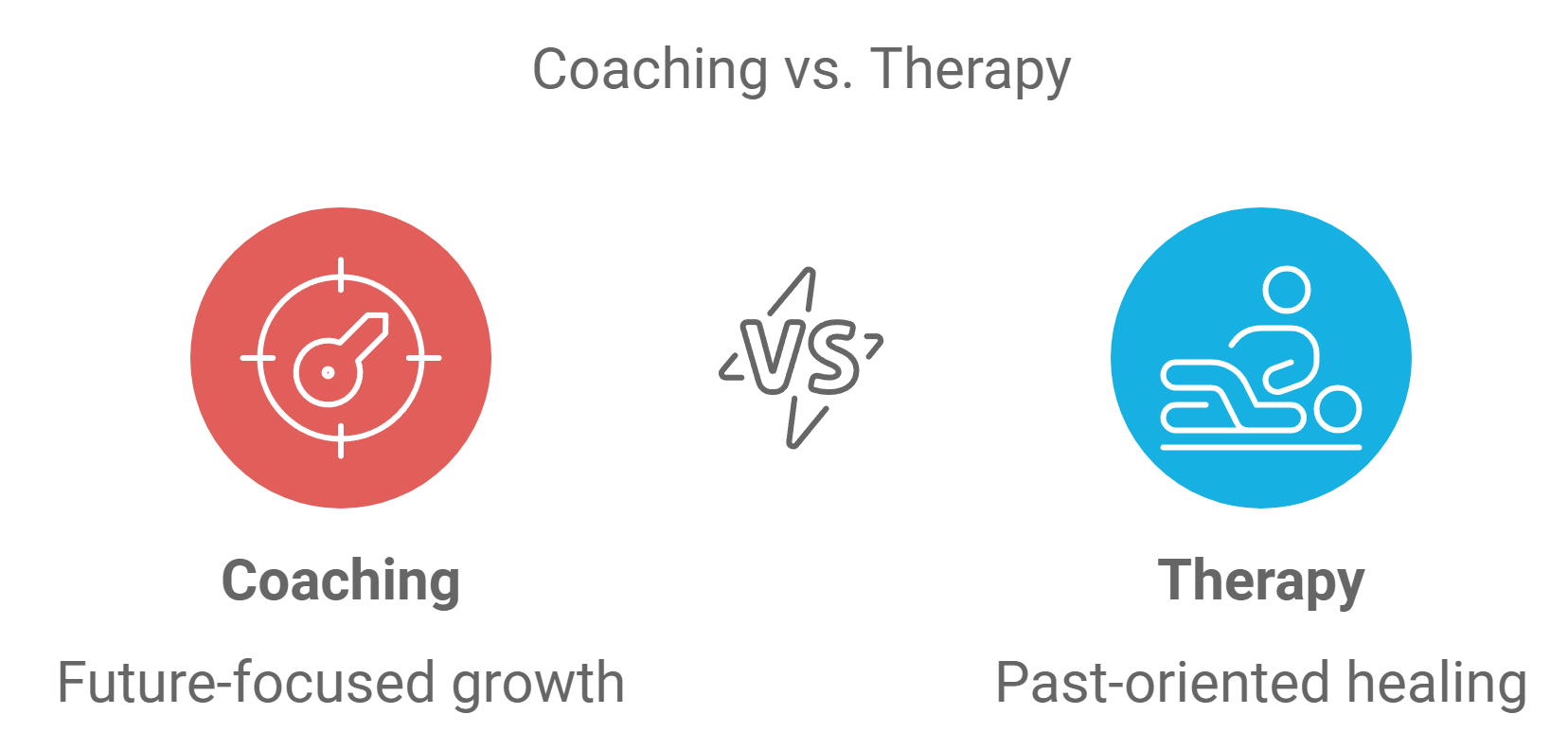
Exploring Therapy: Key Concepts and Approaches
When it comes to understanding therapy, it’s essential to appreciate its foundations, which differ significantly from relationship coaching. Therapy primarily focuses on diagnosing and treating emotional or psychological issues, often rooted in the past. Here are some key concepts and approaches associated with therapy:
Types of Therapy
- Cognitive Behavioral Therapy (CBT): This approach emphasizes the relationship between thoughts, feelings, and behaviors, addressing negative thought patterns to promote positive change.
- Psychodynamic Therapy: Drawing from Freudian concepts, this therapy explores unconscious processes and how past experiences shape current behavior and emotions.
- Humanistic Therapy: Focused on self-actualization and personal growth, this approach encourages individuals to explore their feelings and develop a stronger sense of self.
- Couples Therapy: Specifically designed for couples, this method helps partners improve communication, resolve conflicts, and build healthier interactions.
The Role of the Therapist
Therapists are trained professionals who guide clients through their emotional and psychological challenges. Unlike relationship coaching, where the coach’s role is often more directive, therapists typically take on a reflective role, encouraging clients to delve deeper into their feelings and behaviors. The therapeutic alliance is crucial, providing a safe space where individuals can explore their innermost thoughts.
Goals of Therapy
While coaching goals often focus on actionable outcomes and future aspirations, therapy aims to provide healing and understanding. Here are some general goals of therapy:
- Develop coping skills for managing stress and anxiety.
- Improve emotional regulation and interpersonal relationships.
- Address trauma or past psychological distress.
- Enhance self-awareness and insight into one’s behaviors.
In summary, while relationship coaching and therapy both aim to improve interpersonal dynamics, their methodologies, objectives, and practitioner roles differ significantly, making it essential for individuals to understand these distinctions when seeking help.
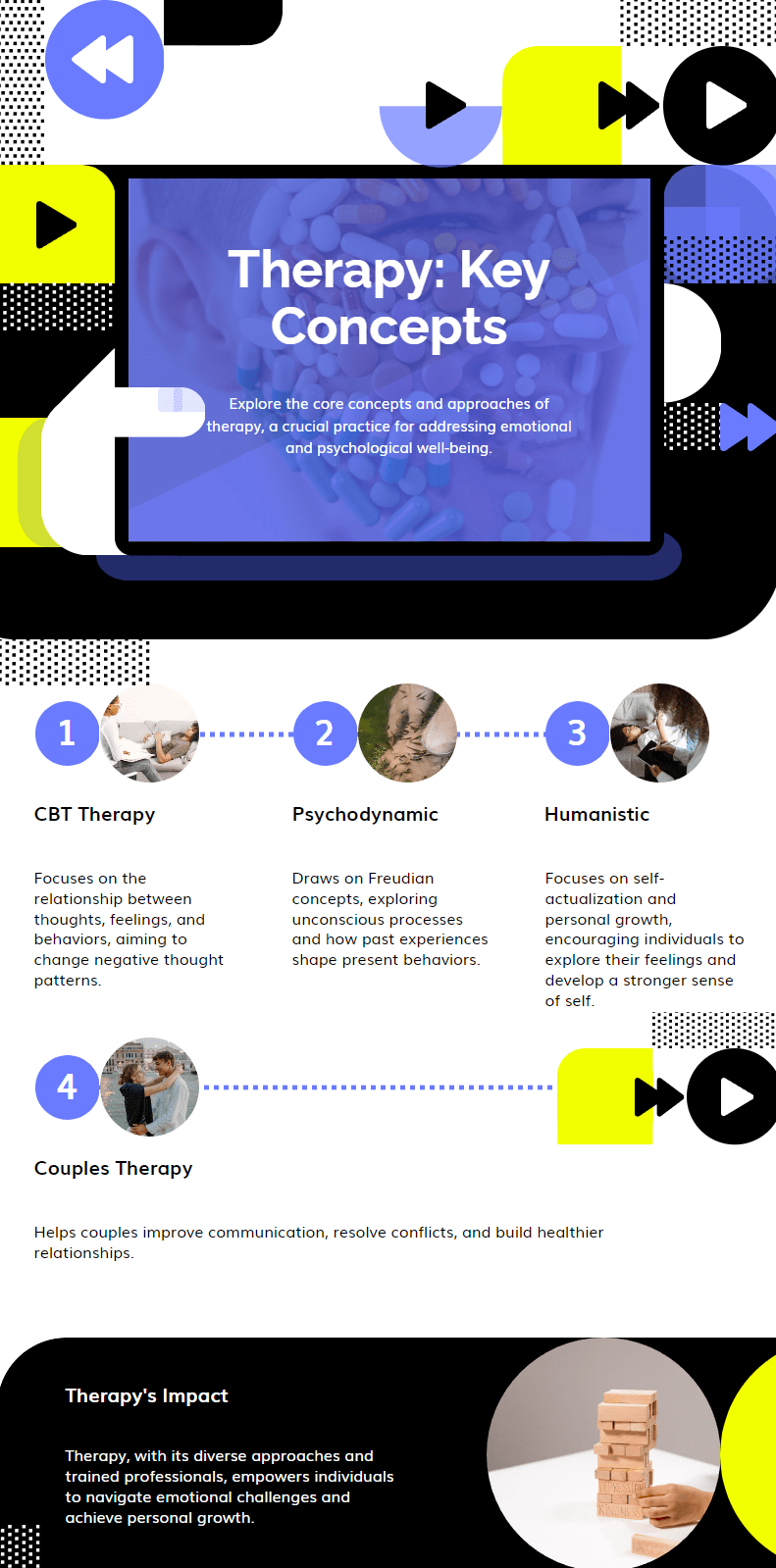
The Main Differences Between Relationship Coaching and Therapy
When exploring the differences between coaching and therapy, it’s essential to recognize that while both professions aim to support individuals in improving their lives, their approaches, goals, and methodologies are distinct. Here’s a breakdown of the main differences:
1. Focus of the Practice
Relationship coaching is primarily future-focused, concentrating on setting goals and achieving specific outcomes. Coaches work with clients to identify actionable steps toward improvement. In contrast, therapy often delves into past experiences and emotional healing, aiming to resolve deeper psychological issues.
2. Nature of the Relationship
The dynamic between a therapist and a client typically involves a more power-directed structure where the therapist leads the client through the healing process. In relationship coaching, the relationship is more collaborative, where the coach and client work as a team towards achieving the client’s objectives.
3. Goals and Outcomes
Coaching goals are usually tangible and focused on personal development, such as improving communication skills, resolving conflicts, or enhancing relationship dynamics. Therapy tends to encompass broader emotional healing, addressing mental health disorders, or trauma recovery.
4. Qualifications and Backgrounds
While both therapists and coaches may have valuable training, therapists typically hold advanced degrees in psychology or social work and are licensed practitioners. Conversely, relationship coaching may not require formal credentials, leading to a range of training programs and certifications among coaches.
5. Duration of Engagement
Therapy often involves long-term engagement, particularly when addressing significant psychological concerns. In contrast, relationship coaching usually involves a shorter-term commitment with a defined goal or outcome in mind.
Understanding these critical differences will help clients make informed choices about whether to pursue relationship coaching or therapy based on their individual needs and circumstances. Whether one opts for a therapist vs coach, the decision ultimately hinges on the desired approach to personal growth and relationship enhancement.
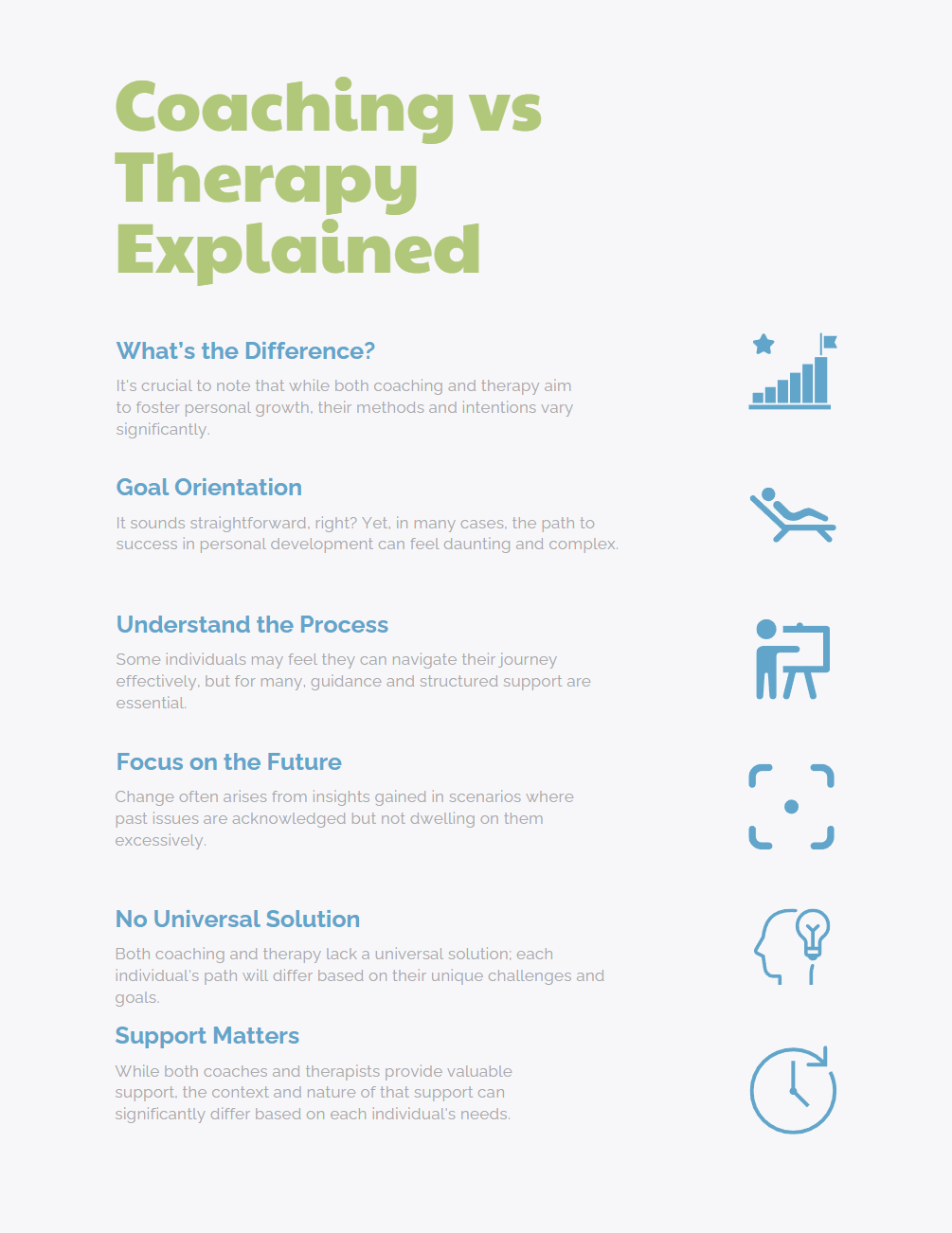
When to Choose Relationship Coaching for Growth
Deciding when to engage in relationship coaching can play a pivotal role in fostering personal and relational growth. Unlike therapy, which often addresses deeper psychological issues, relationship coaching is designed to help individuals and couples enhance their relationship dynamics and achieve specific growth goals. Here are some scenarios when coaching may be a beneficial choice:
- Desire for Improvement: If you and your partner find yourselves in a stable relationship but wish to fine-tune communication skills or enhance intimacy, relationship coaching can provide the tools necessary to achieve these goals.
- Setting and Achieving Specific Goals: If your focus is on setting actionable relationship goals, such as better conflict resolution or collaborative decision-making, a coach specializes in this forward-thinking strategy. This contrasts with traditional forms of therapy that may focus more on underlying issues.
- Mediation During Transitions: During major life transitions—like marriage, parenthood, or career changes—relationship coaching can help couples strengthen their bond and navigate changes more effectively. It offers practical strategies to address these shifts rather than delving into past traumas.
- Understanding Relationship Dynamics: If you’re looking to improve your understanding of how your relationship functions without needing to address significant psychological matters, relationship coaching vs therapy becomes a clear distinction. Coaches can help clarify roles and expectations, improving overall compatibility.
- Proactive Approach: Engaging in relationship coaching while your relationship is still well-functioning can be a proactive approach to future challenges. It ingrains habits of effective communication and understanding that can prevent future disconnects.
In contrast, if you find that deep-seated issues, trauma, or mental health concerns are obstructing the ability to relate positively, therapy for relationships is more suited to provide the needed support. Recognizing the differences between coaching and therapy helps you make informed choices about your relationship’s future.
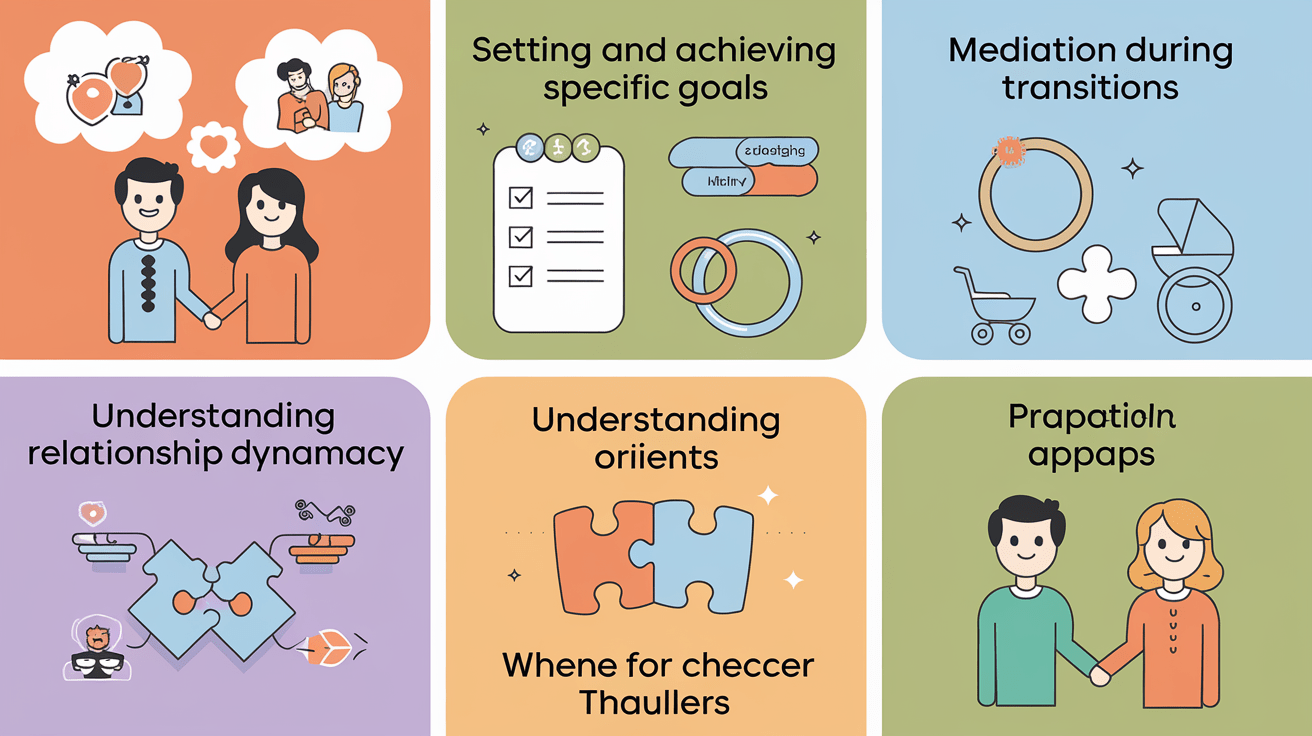
Benefits of Relationship Coaching Over Traditional Therapy
Relationship coaching offers numerous advantages compared to traditional therapy, making it an attractive option for those looking to enhance their partnerships. Here are some key benefits:
| Aspect | Relationship Coaching | Traditional Therapy |
|---|---|---|
| Focus and Goals | Emphasizes goal-setting and future planning with actionable steps. | Tends to focus on past experiences and emotional healing. |
| Duration and Structure | Often shorter in duration, with structured sessions aimed at achieving specific outcomes. | Can be more open-ended, with sessions that address a broad spectrum of emotional issues. |
| Approach | Utilizes practical tools and strategies for immediate improvements in relationships. | Emphasizes deep psychological exploration and understanding. |
| Outcome Orientation | Focused on achieving measurable results and developing personal skills. | Centered on emotional healing and self-discovery. |
Relationship coaching also fosters a proactive rather than reactive mindset. While therapy for relationships primarily addresses existing issues and challenges, coaching enables couples to develop and refine their relationship skills, set new objectives, and cultivate a shared vision for their future.
Moreover, with the option for virtual sessions, relationship coaching provides flexibility that can be challenging to find in traditional therapy. This accessibility allows individuals to engage in coaching sessions from the comfort of their homes, making it easier to fit into busy schedules.
In summary, if you’re looking for guidance that is goal-oriented and designed to enhance your relationship dynamics, exploring relationship coaching vs therapy might lead you to innovative solutions tailored to your needs. The emphasis on future possibilities within coaching can invigorate relationships, setting the foundation for personal growth and improvement.
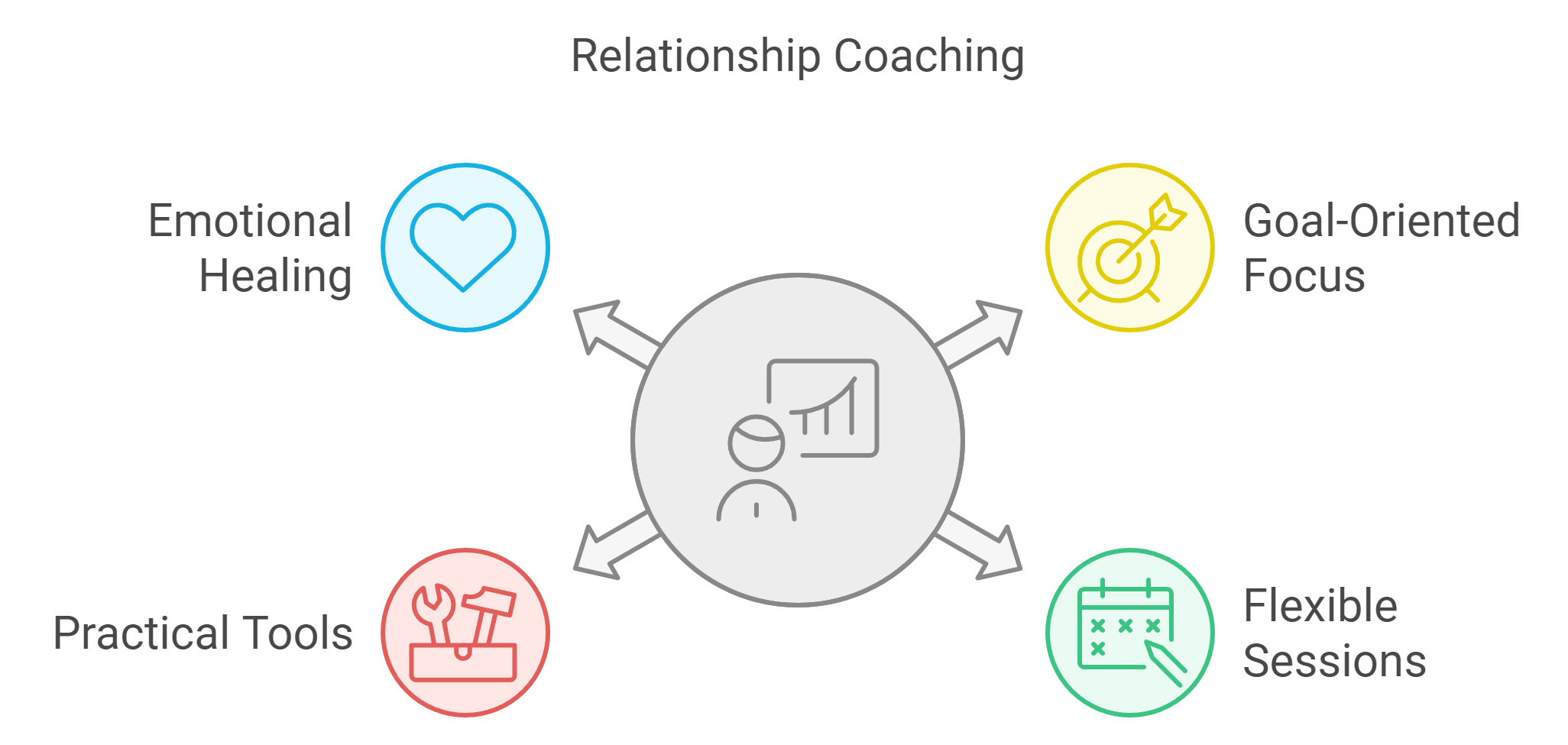
How Relationship Coaching Complements Therapeutic Practices
While relationship coaching and therapy serve distinct purposes, they can also work harmoniously to enhance personal growth and relationship satisfaction. Understanding how these two approaches complement each other can provide individuals and couples with a more well-rounded support system.
One of the key distinctions is that therapy often delves into past traumas and emotional barriers, while relationship coaching focuses on setting clear goals and actionable steps for the future. Through this alignment, coaching can help individuals apply what they learn in therapy to create meaningful change in their relationships.
Here are some ways in which relationship coaching complements therapeutic practices:
| Aspect | Relationship Coaching | Therapy |
|---|---|---|
| Focus | Future goals and aspirations | Past experiences and emotional healing |
| Approach | Action-oriented and solution-focused | Explorative and insight-driven |
| Duration | Short-term, often scheduled sessions | Long-term, can be ongoing |
| Outcomes | Skill-building and growth | Healing and understanding |
For those experiencing issues that require therapeutic intervention, coaching can serve as an effective complementary practice. Coaches can help clients implement strategies discussed in therapy, reinforcing the principles of emotional well-being while encouraging proactive, positive change in their relationships. This synergistic relationship creates a safe space to explore both past issues and future possibilities, striking a balance that enriches personal and relational health.
In summary, integrating relationship coaching with therapeutic practices can provide a comprehensive framework for individuals seeking improvement in their personal and romantic relationships. Recognizing the differences between coaching and therapy allows clients to harness the strengths of both methods effectively.
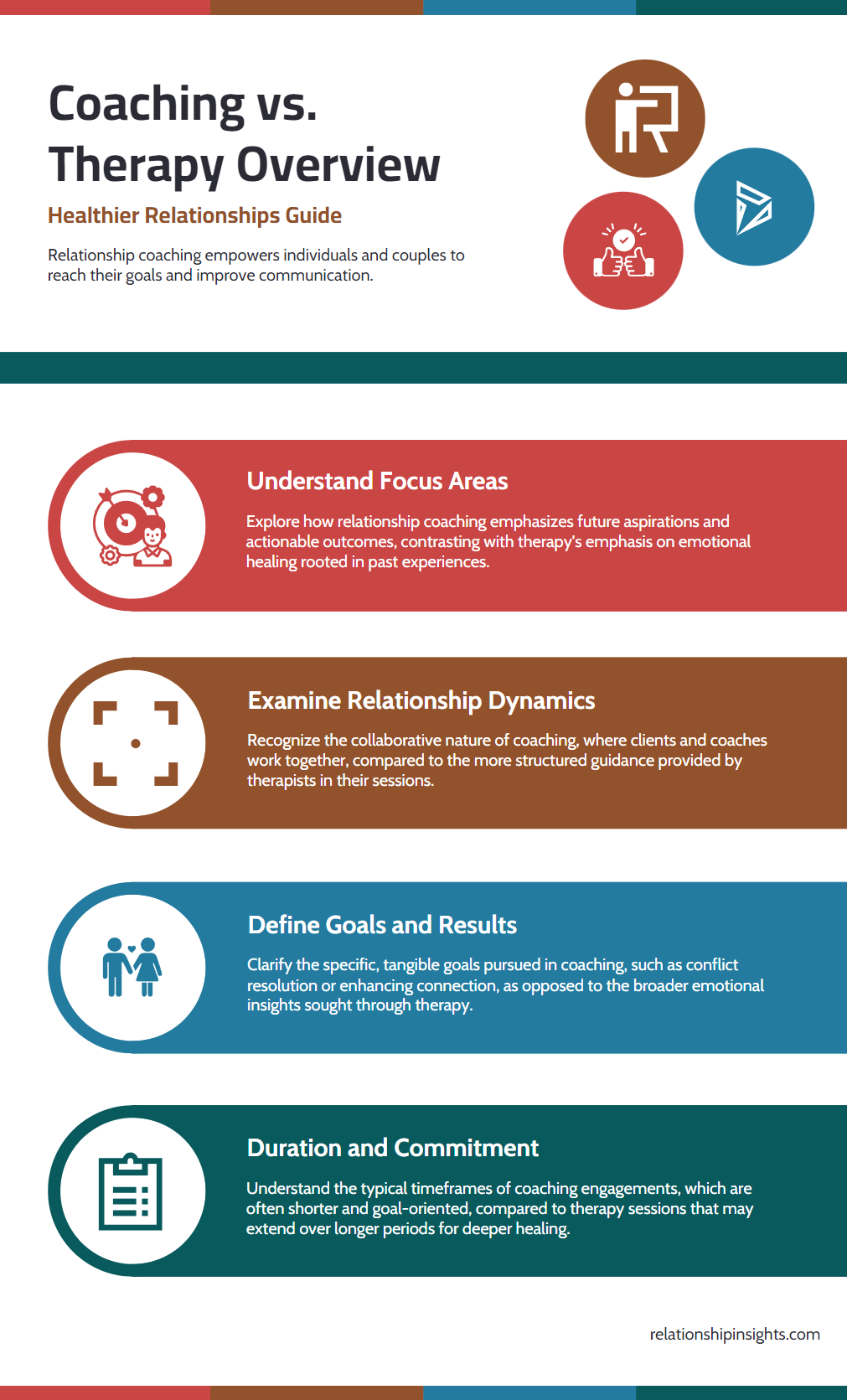
Frequently Asked Questions
What is the primary focus of relationship coaching?
Relationship coaching primarily focuses on helping individuals and couples set and achieve their personal and relational goals, such as improving communication, enhancing intimacy, and resolving conflicts.
How does therapy differ from coaching in terms of approach?
Therapy often delves into emotional and psychological issues from the past that may affect present behavior, while coaching is more present and future-oriented, focusing on actionable strategies and personal development.
Who can benefit from relationship coaching?
Anyone looking to improve their relationship dynamics, whether they are in a committed partnership or navigating dating challenges, can benefit from relationship coaching.
Are therapists licensed professionals?
Yes, therapists are typically licensed professionals with advanced degrees in psychology, social work, or counseling, whereas coaches may not require formal credentials.
Can relationship coaching complement therapy?
Yes, relationship coaching can complement therapy by providing practical tools and strategies while therapy addresses deeper emotional issues.
What kind of clients do relationship coaches typically work with?
Relationship coaches usually work with clients who are motivated to make specific changes in their relationships, often seeking guidance or support during transitions or challenges.
Is confidentiality a standard practice in both coaching and therapy?
Yes, confidentiality is a standard practice in both coaching and therapy; however, therapists are bound by more stringent legal and ethical regulations regarding client privacy.















[…] matters. Inquire about their background and ask specific questions regarding their approach to relationship coaching. Understanding their coaching style will help you determine if it aligns with your expectations and […]